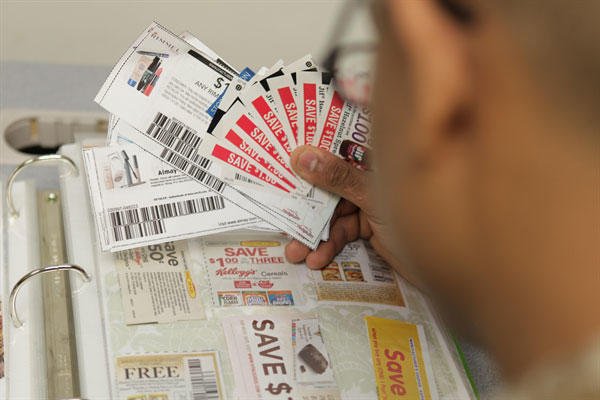Commissary officials will be cracking down on bulk coupon purchases in a move designed to "protect the commissary benefit" -- the first of its kind since the Defense Department confirmed a plan to gut the program's budget.
The crackdown, announced on the Defense Commissary Agency's Facebook page Feb. 26, looks to block shoppers who use the store to turn couponing into a money making enterprise as well as those who abuse the system by buying products to resell.
"This policy is designed to curtail possible abuse of the commissary benefit. The commissary is intended to enhance the quality of life of members of the uniformed services, retired members, and dependents, and to support military readiness, recruitment, and retention," DeCA officials said. "The commissary is not intended to be a bank or generate personal income for its patrons."
A 2015 DoD budget proposal, first reported by Military.com, looks to slash the commissary's funding from $1.4 billion to $400 million by 2017. Should it be approved by lawmakers, insiders speculate that DeCA will be forced to make up the bulk of that budget shortfall by asking Congress to allow them to raise prices.
The newly announced rules restrict the ability of shoppers to place large special product orders. Under the new guidelines, shoppers may not order more than three cases or 36 units of any product. The rules also block patrons from "frequent/multiple" special orders as well as shoppers from bringing "unreasonable quantities" in for return, according to the Facebook post.
DeCA officials said they do not track how many special orders are placed annually or how much those orders cost the agency each year.
Previous to the rule change, shoppers were permitted to make unlimited special bulk orders of any product carried by the commissary system. Rather than clear the shelves of any given item, the policy allowed coupon users, for example, to order full cases of a sale item for which they held high valued coupons. While those suspected of using the system as a money making venture were supposed to be reported as abusers, the orders themselves were allowed.
Military shoppers also used the system to place special orders for food for units or on-base functions. DeCA officials said the new policy is only designed to shut down abuse, and regular orders for on-base functions will still be permitted.
Those who travel long distances to visit the commissary and make special orders so they can ensure that enough of a product is in stock when they arrive will also still be permitted to regularly place orders, officials said.
The previous rules also allowed returns of any number of products for any reason at any time, with or without a receipt except in the case of tobacco products or infant formula. Refunds of more than $25 would be paid back to the shopper in the form of a DeCA gift card, and those below $25 are given in cash.
But the problems came when users abused the system. Some used the special order system to buy items in bulk, which they then took off base and resold at a mark-up, a long forbidden practice.
Others used it to order huge quantities of items for which they had coupons. Those shoppers would sometimes then return the items, often numbering in the hundreds, for the full value cash back. A shopper who had coupons for $2 off $3 items, for example, could buy them, pay $1 per item plus the commissary's normal 5 percent surcharge, and then later return it and get the full $3 per item plus surcharge back.
The news rules look to make those practices more difficult, if not impossible.
Another newly announced rule change alters the way couponers are able to receive cash back on purchases. Currently some couponers use the system as way to make money while buying large quantities of any given product. If a shopper has coupons for more than the price of the product, DeCA allows shoppers to receive up to $25 in cash back and then gives the rest to the shopper on a commissary gift card.
For example, in what one commissary user described as "the great KY lube incident of 2011," shoppers used coupons for $3 off one tube of KY brand personal lubricant to bring in significant income. Since the commissary sold the small bottles for $2 each, shoppers were able to use the coupon and earn $1 simply by buying the product.
"It was an extreme couponer's dream coupon so to speak," said Josey Thompson, a couponer and commissary shopper stationed with her Army husband at Fort Campbell, Ky. "My husband was stationed at Fort Hood at the time, and you could see people leaving the Warrior Way Commissary with more lube than than a Proctology Practice probably uses in a lifetime. People were ordering the 2 ounce bottles of KY Lubricant by the pallets, literally pallets. The most I saw was 400 bottles for one shopper. Not only were the bottles free but the cashier had to pay over $400 in cash back to the shopper."
To further game the system and get around the no cash over $25 rule, extreme couponers would ask that their orders be split into multiple purchases. That practice would allow them to receive several cash payouts of under $25 instead of one $25 payout and gift cards for the remainder.
The new rules shut that practice down.
"Commissaries will no longer allow multiple or 'split' transactions for orders with coupon overages," the announcement states.
Commissary officials said the new ID card scanning system, rolled out early this year, could be used to confirm shoppers are abusing the system.
"The Defense Commissary Agency has no intention of monitoring patron abuse through the scanning of ID cards," they said. "However, abuse once committed may be confirmed by law enforcement or appropriate installation officials through a comparison of the information in the DEERS database with the patron's transaction."
Even though commissary officials confirmed that the rules are only designed to block cash back abuse, some extreme couponers worry that the new rules are too ambiguous and will hurt their ability to save money.
"I think it will affect us and others. I think I will shop somewhere else," said April Hughey, an Army wife and extreme couponer at Joint Base Elmendorf-Richardson, Alaska who saved about $1,400 last year just by using coupons. "Maybe I'm just upset about it … but honestly if I'm not saving there then I'm not shopping there. I'm not loyal to the store. I'm loyal to the savings."
Hughey said she never uses more than 20 of the same coupons for any given set of products, but relies on doing her order in separate transactions to use all of her coupons. And while the policy said those separate transactions are banned only in the case of overages, which Hughey said she rarely gets, she worries that commissary employees will not be aware of the difference.
"I don't coupon to make overages. I do it so we can eat well," she said. "We live in Alaska and any other store is way more. Even with the extra pay we get, I also work full time. It is still hard to make ends meet when milk is $4.49."
But Thompson sees the new rules as an important way to curb abuse.
"My overall view is that those who are upset and up in arms about this are the abusers," she said. "They are probably the couponers who abused the system without thinking what it could do to our wonderful shopping benefit. I will continue to coupon and I will continue to shop at the commissary because beyond what most people seem to think they really are lower priced."
-- Amy Bushatz can be reached at amy.bushatz@monster.com






























